Flexible Learning
Information Box Group
Flexible learning is an approach to learning that meets you where you’re at and aims to cultivate wonder, inspiration, and transformation through interdisciplinary and experiential learning that pushes the boundaries of how learning happens.
-
Wonder: Experiencing curiosity, fascination, and surprise in the learning process.
-
Inspiration: Feeling motivated to make a difference in oneself, in others, and in the world at large
-
Transformation: Leaving a learning experience a different person than when one started.
At the INSPIRE Office of Flexible Learning, we envision flexible learning in the following ways:

At your own pace
When we learn matters. You should have a say in when you learn. Our offerings and the Spring Intersession term itself have been created to encourage you to learn at a pace that works for you and the life you lead beyond the classroom.

In different places
Where we learn matters. Whether you’re interested in exploring your community, learning from a distance, or collaborating in innovative lab spaces, flexible learning can happen anywhere.

With/from different people
Who we learn with and who we learn from matters. Learning shouldn’t be limited to the program or Faculty we call home. Our courses and programs are intentionally interdisciplinary; flexible learning encourages you to build new relationships and expose yourself to different ways of seeing and interpreting the world.

Along new pathways
What we learn matters. Learning shouldn’t be confined to the pathway our academic journey began on. Branching out will allow you to explore new academic and career pathways and open your eyes to possibilities you might never have imagined.

Via innovative pedagogies
How we learn matters. Pedagogy, the art and science of teaching, is a practice that instructors care deeply about. At INSPIRE, our instructors are always striving to test out new approaches that can make your learning experience the best experience possible.

With a sense of purpose
Why we learn matters. Learning isn’t just about gaining new knowledge, it’s about making connections between that knowledge to better understand ourselves and our purpose. At INSPIRE, we create learning experiences that encourage you to dream, reflect, and make sense of where you’re headed.
How do I get started?
The links below have been created to help you learn more about the flexible learning opportunities that you might be interested in and to suggest some steps you might take to pursue them. Areas you might want to explore include:
- INSPIRE Courses: Learn more about our core suite of INSPIRE courses to find out which one might work for you!
- Interdisciplinary Minors: If you’re interested in a more formal flexible learning pathway, you might be interested in one of McMaster’s interdisciplinary minors. You can often get started within Spring Intersession and build out your experience from there!
- Intersession: This innovative academic term runs from May 1 to May 31 every year. INSPIRE courses and other offerings allow you to get up to 6 units of credit through a variety of 3 unit options that are available both in-person and online.
- Find Your Pathway: Interested but not sure how you might build flexible learning opportunities into your time at McMaster? This page has some helpful tips and guidance to support your learning journey.
- Testimonials: Interested in what other students have to say about INSPIRE courses and flexible learning opportunities?
Course Offerings
The INSPIRE Office of Flexible Learning administers a core suite of interdisciplinary INSPIRE courses and course offerings from both the Interdisciplinary Minor in Africa and Black Diaspora Studies and the Interdisciplinary Minor in Latin American and Latinx Studies.
Learn more about our diverse range of course offerings below.
INSPIRE COURSE OFFERINGS
The INSPIRE Office of Flexible Learning offers 8 unique, interdisciplinary INSPIRE courses in collaboration with campus and community partners. Courses are uniquely scheduled to allow for curriculum flexibility; involve engaging instructors who teach in novel and innovative ways; and offer interdisciplinary opportunities to work in small groups and with peers across campus.
Information Box Group
INSPIRE 1A03 Learn More
Multidisciplinary Experiential Learning Opportunities
INSPIRE 1PL3 Learn More
Personal Leadership through University Transition
INSPIRE 2II3 Learn More
Introduction to Interdisciplinary Inquiry
INSPIRE 3AR3 Learn More
Exploring Leadership in Athletics and Recreation
INSPIRE 3EL3 Learn More
Experiential Learning Opportunities
INSPIRE 3II3 Learn More
Multidisciplinary Inquiry
INSPIRE 3MP3 Learn More
A World of Big Questions and Multiple Perspectives
INSPIRE 3WW3 Learn More
Exploring Leadership in University Orientation
AFRICA AND BLACK DIASPORA COURSE OFFERINGS
Africa and Black Diaspora courses (ABLD) provide students with an in-depth understanding of African and African/Black-diaspora peoples and societies around the world. These courses foster critical thinking skills, collaborative work while engaging in Black histories and cultures from interdisciplinary perspectives. They are also featured on the Interdisciplinary Minor in Africa and Black Diaspora Studies.
Information Box Group
ABLD 2AE3 Learn More
Introduction to Afro-Environmentalism
ABLD 3BA3 Learn More
Topics in Black, African and African Diaspora Studies
ABLD 3CD3 Learn More
Topics in the Black Caribbean and its Diasporas
ABLD 4BH3 Learn More
Critical Issues in Black Communities and Health
LATIN AMERICAN AND LATINX STUDIES COURSE OFFERINGS
Latin American and Latinx Studies (LATAM) introduces students to various perspectives and topics to begin understanding Latin America and its peoples within its totality and complexity. This course of study centers the multivalent experiences of Latin American people in Latin America and Latinx peoples within the context of the diaspora in Canada. These courses are featured on the Interdisciplinary Minor in Latin American and Latinx Studies.
Information Box Group
LATAM 2A03 Learn More
Introduction to Latin American and Latinx Studies
LATAM 3A03 Learn More
Critical Contemporary Issues in Latin American and Latinx Studies
Interdisciplinary Minors
An Interdisciplinary Minor is a distinction that a student can receive on their transcript upon graduation. It is not a degree. An Interdisciplinary Minor is one that spans across several academic disciplines to broaden learner’s perspectives on the topic. It will contain courses from several Faculties on campus.
Scroll down to learn more about what a minor is, when you can get started, and the interdisciplinary minor options available at McMaster.
Interdisciplinary Minors
An Interdisciplinary Minor spans across several academic disciplines to broaden your perspective on the topic.
Students interested in pursuing an Interdisciplinary Minor are encouraged to consult with an academic advisor from their home Faculty to verify eligibility and for assistance in course selection and planning.
A Minor is a distinction that a student can receive on their transcript upon graduation. It is not a degree. You are required to take 24 units from a specific Course List. You can take a Minor that is completely unrelated to your Major – that’s the point! Minors are an opportunity to show you have interests that are outside your main area of study.
Benefits of pursuing an Interdisciplinary Minor include diversifying your academic journey, gaining transferable skills, collaborating with community partners, gaining a global perspective, and sharpening critical thinking.
You can start your minor by enrolling in a class that is on the Course List for the Minor(s) you are looking to pursue. See the section below for more details.
Depending on your program requirements, you may be able to use your elective units towards the completion and declaration of a Minor.
Did you know that there are several courses that can count towards more than 1 Minor?
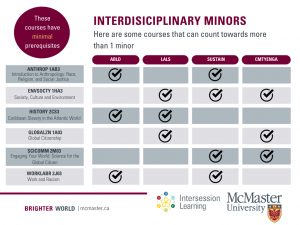
* This image is an example of courses, with minimal prerequisites, that are open to students Level I and above, which can be used towards the completion of several Minor requirements.
There is no guarantee that a student will be able to automatically enrol in a course from a Minor Course List that is full. Students should plan in advance, always connecting with their home Faculty or academic advisor to determine the best plan.
One of the benefits of completing an Interdisciplinary Minor is that there are over a dozen eligible course options on each of the Course Lists. So, if one course is full, you have the option to choose from a variety of others that can be applied towards the completion of your Minor.
Refer to the Academic Calendar for more details on Course Lists.
Explore some of MCMaster's Interdisciplinary Minors
Africa and Black Diaspora Studies Requirements
The Interdisciplinary Minor in Africa and Black Diaspora Studies is made up of courses spanning across more than a dozen departments. A Minor in Africa and Black Diaspora Studies provides students with in-depth understanding of Black and African-diaspora peoples and societies around the world.
Requirements
24 units total are required. See the Academic Calendar for more details.
Featured Courses:
- ABLD 3BA3 – Topics in Black, African and African Diaspora Studies
- ABLD 3CD3 – Topics in the Black Caribbean and its Diasporas
Did you know that ABLD 3BA3 and ABLD 3CD3 can be applied towards the Minor in Africa and Black Diaspora Studies AND the Minor in Latin America and Latinx Studies?
Community Engagement Requirements
The Interdisciplinary Minor in Community Engagement allows students to deepen their understanding of communities and develop skills for principled and effective engagement. The minor is designed to provide a foundational knowledge and skills for participation in communities, regardless of the student’s primary field of study. The interdisciplinary nature of the minor allows for a broad knowledge base from which to establish relationships with a range of communities both locally and globally.
Requirements
24 units total required. Students must ensure completion of:
- 3 units from CMTYENGA 2A03
- 21 units, must include a minimum of:
- 6 units from Course List A
- 3 units from Course List B
- 3 units from Course List C
See the Academic Calendar for more details.
Globalization Studies Requirements
The Interdisciplinary Minor in Globalization Studies provides students with the opportunity to explore the complex idea of globalization from a multi-disciplinary perspective. Students will have the opportunity to complete courses from the Social Sciences, Humanities, Health Sciences and Science faculties that cover a wide variety of themes related to globalization, and will be able to tailor their course selection according to their interests.
Requirements
24 units total required. Students must ensure completion of:
- 3 units from GLOBALZN 1A03 – Global Citizenship
- 21 units from Course Lists 1, 2, 3 and 4. At least 9 of these units must be selected from outside the student’s own program.
See the Academic Calendar for more details.
Latin American and LatinX Studies Requirements
Latin American Studies is the interdisciplinary approach to explore the histories, linguistic traditions, literatures, cultures, societies, geographies, archaeologies, identities, migrations and diasporas of Latin America and its peoples.
LatinX Studies is the interdisciplinary approach to exploring the histories, migration patterns, race and ethnicities, identity-formation, geographies, and experiences of the LatinX/Latin American communities inhabiting diasporic locations in Canada and elsewhere in the world.
The Minor in Latin American and LatinX Studies exposes students to methodologies, knowledge, and theoretical frameworks for understanding “What is Latin America?” and “What are LatinX Studies?”
Requirements
24 units total are required. Students must also ensure completion of:
- 6 units from LATAM 2A03 & LATAM 3A03
- 6 units from Course List A
- 12 units from Course List A & B
See the Academic Calendar for more details.
Sustainability Requirements
Addressing sustainability in our society poses complex challenges that require interdisciplinary solutions. Sustainability is frequently taught in silos within individual disciplines, and most often within individual and isolated courses.
The goal of the Minor is to alter this pedagogy and teach sustainability both within and across disciplines. The Minor provides a path for students to study diverse aspects of sustainability from different disciplines and integrate them into a cohesive whole. The scope and definition of sustainability used for the Minor are guided jointly by the United Nations Sustainable Development Goals and the Association for the Advancement of Sustainability in Higher Education.
Requirements
24 units total are required. Students must also ensure completion of:
- 3 units from a SUSTAIN course
- 21 units from the Course List
See the Academic Calendar for more details.
Civic Vitality, Democracy, Elections Requirements
The CIVDEM Interdisciplinary Minor equips students to work towards strengthening civic vitality, democratic resiliency, and electoral integrity, as well as empowering the underrepresented to participate in the political and electoral process. Students gain the foundations of knowledge, focused thematic expertise, and research competencies with respect to core areas (Civic Vitality, Democracy, Elections) that are local, national and global in scope. They are encouraged to think beyond the walls of the classroom to prepare for a lifetime of civic learning and practice, built on connecting with a large and effective network of advocates, innovators, practitioners, researchers and policymakers who are working to advance civic engagement, democratic processes and institutions, electoral management and integrity.
Requirements
24 units total are required. Students must also ensure completion of:
- Minimum of 6 units completed in each of the thematic areas:
- Course List A (CIVIC Vitality)
- Course List B (DEMOCRATIC Norms, Processes and Institutions)
- Course List C (ELECTIONS Management and Integrity)
See the Academic Calendar for more details.
Hear what our students have to say!
Meet Aaron

Meet Wendy

Meet Sofia
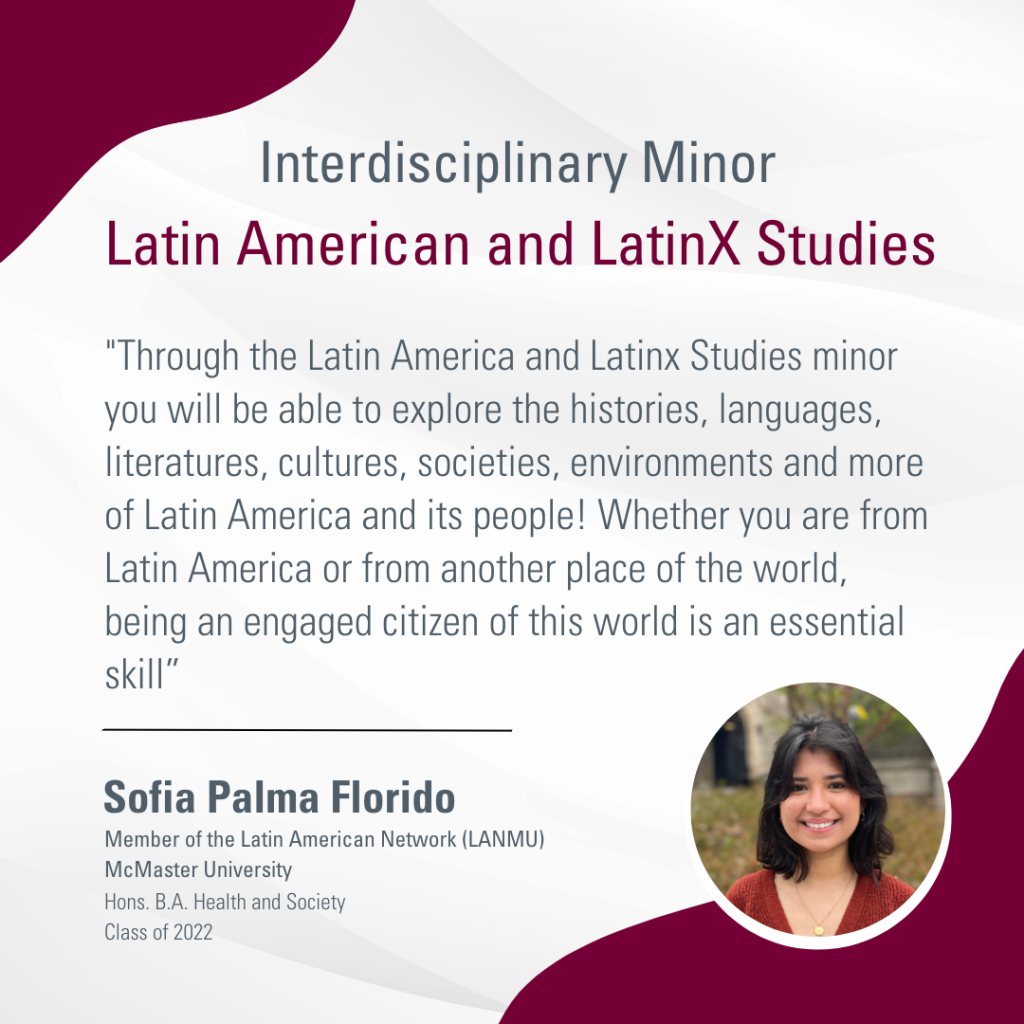
Meet Enoyo

Meet Sufal

Meet Daniel
Meet Paula
Meet Daniella
Intersession Learning
Are you interested in exploring new academic pathways? Or perhaps you’re excited to take a new course on a contemporary topic or issue? Maybe you just want to take a course or two in May to ease your Fall and Winter workload?
If you answered yes (!) to any of these questions, the Intersession term may be just the thing you’re looking for!
A 4-week semester designed to be as flexible as possible
Intersession is a 4-week academic semester that provides novel interdisciplinary and experiential learning opportunities that are not available to all students in the typical fall/winter semester. Envisioned as a semester that fosters experimentation in both teachers and learners, Intersession was created to reimagine the academic experience in flexible ways that acknowledge the realities facing our current students; these realities include:
-
Increased levels of stress
-
Persistent financial burdens that often require students to work full-time or part-time during their studies, and;
-
Various life circumstances that make the traditional cycle of 2 full-time semesters and a 4-month break over spring and summer challenging for many students.
-
A desire to build connections and relationships with other students from across the University
If you found yourself nodding along as you read this list, or if you’re at all intrigued by the idea of taking a cool course during May, you might want to head over to our Intersession pages to explore your options. Hope to see you in May!
Spring and Summer @ Mac
Interested in taking your learning beyond the fall and winter experience? Spring and Summer @ Mac opens doors to new possibilities wherever the warmer months may find you!
Pursue flexible learning wherever Spring and Summer finds you
While much of the academic calendar revolves around Fall (September-December) and Winter (January-April) semesters, there are still four additional months of the year that offer a range of ways for you to continue or kick off your learning experience at McMaster. Designed with a range of flexible options and an increasing number of courses to choose from, Spring and Summer @ Mac includes the following flexible learning opportunities:
- Intersession Term: A 4-week semester that runs each May.
- Spring Term: A 6-week semester that runs each May and June.
- Summer Term: A 6-week semester that runs each July and August
If you’re looking to expand your learning horizons into the Spring and Summer months, whether that be online or in Hamilton, Spring and Summer @ Mac may be just the ticket!
Student Testimonials
Interested in flexible learning, but still not sure about it? Feel free to ask around to see if any of your friends have taken one of our courses, but just in case they haven’t, here are a few testimonials to help you figure out if flexible and interdisciplinary learning is for you.
Check out some of these Student Testimonials to learn about what these courses can offer you.
INSPIRE Courses
FALL 2021
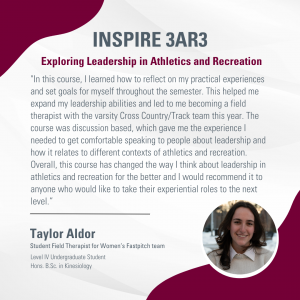 |
FALL 2022
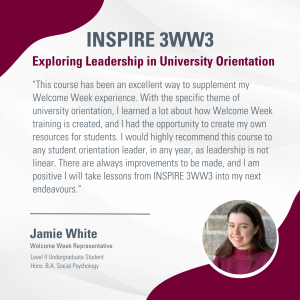 |
 |
 |
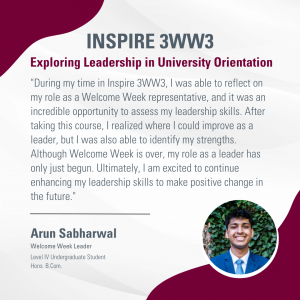 |
LATAM Courses
FALL 2022
 |
 |
 |
ABLD Courses
Possible Pathways
Flexible learning meets you where you’re at. For some that might mean slowing down, speeding up, or exploring a new direction altogether. The examples below are meant to provide a few ideas of possible flexible learning pathways.
Expandable List
Regardless of where you’re coming from, we know that the transition to university can be challenging, not only due to the transition itself, but especially when combined with all of the other moving parts of your life. INSPIRE course offerings are designed to support your transition to university, your transition through university, and your transition beyond university. This pathway might intentionally incorporate courses such as INSPIRE 1PL3 and INSPIRE 1A03 into your first year experience to support the transition to university, while including upper year INSPIRE courses that help you think about where you’re headed both within your studies and beyond.
Perhaps you’d like to finish your degree earlier than planned. By taking courses during Intersession, Spring, or Summer semesters you can gain more academic credits each year than your traditional course load. This pathway might be ideal for those who are hoping to move on to a career or further education sooner than initially planned. If taking this route, it is important to consult with an academic advisor to ensure you’re able to complete courses mandatory to your program and to consider any other implications of Intersession, Spring, and Summer study.
Completing a 4-year undergraduate degree at McMaster requires obtaining 120 units of academic credit. For students enrolled in a typical Fall and Winter semester cycle of learning, this means pursuing 15 units of credit per term, most often (but not always) taking the form of five 3 unit courses. For many of us, taking 5 courses at a time can be challenging for a number of reasons. Whatever your reason, you may be interested in spreading the load of your learning into the May Intersession, Spring, and Summer terms. For example, a student taking the equivalent of 6 units (two courses) during the May Intersession term could take a courseload of 12 units (four courses) in both the Fall and Winter semesters. This pathway might be ideal for those who are feeling overwhelmed with a five course load or those who have work or family responsibilities.
University is meant to be a time of personal growth and reflection that prompts us to rethink our assumptions about the world around us. For many of us, this process helps us to further clarify our interests within the disciplinary area of focus we enrolled in, but for others it might prompt us to ask “what else is out there?” If you’re wondering about other areas of study beyond your own program, you might want to use May Intersession, Spring, or Summer learning to open new doors and possibilities. By trying something new in an area that sounds interesting to you, you might find an excellent compliment to your primary area of study or find a new primary area of study altogether! This pathway might be ideal for those interested in exploring an interdisciplinary minor or taking a course in a discipline completely different from their core studies.
The May Intersession term prioritizes space for instructors who want to explore contemporary issues through an interdisciplinary lens via the INSPIRE 2II3, 3EL3, and 3II3 course codes. What does this mean for students? It means that every May there will be brand new courses that have never been offered before taught by instructors who are at the forefront of both the issues themselves and creative approaches to teaching and learning. If you’re looking for a course or two that is completely different from anything you’ve ever taken at McMaster, this pathway might be ideal for you. Check out our course listings page beginning in December of each year to see what’s on the horizon for the May Intersession term!
Interested in creating your own flexible learning pathway?
If any of these examples resonate with you, or if not but you’re trying to figure out a pathway that might work for you, feel free to reach out to us; we’re always happy to chat! Simply email us at inspire@mcmaster.ca!

